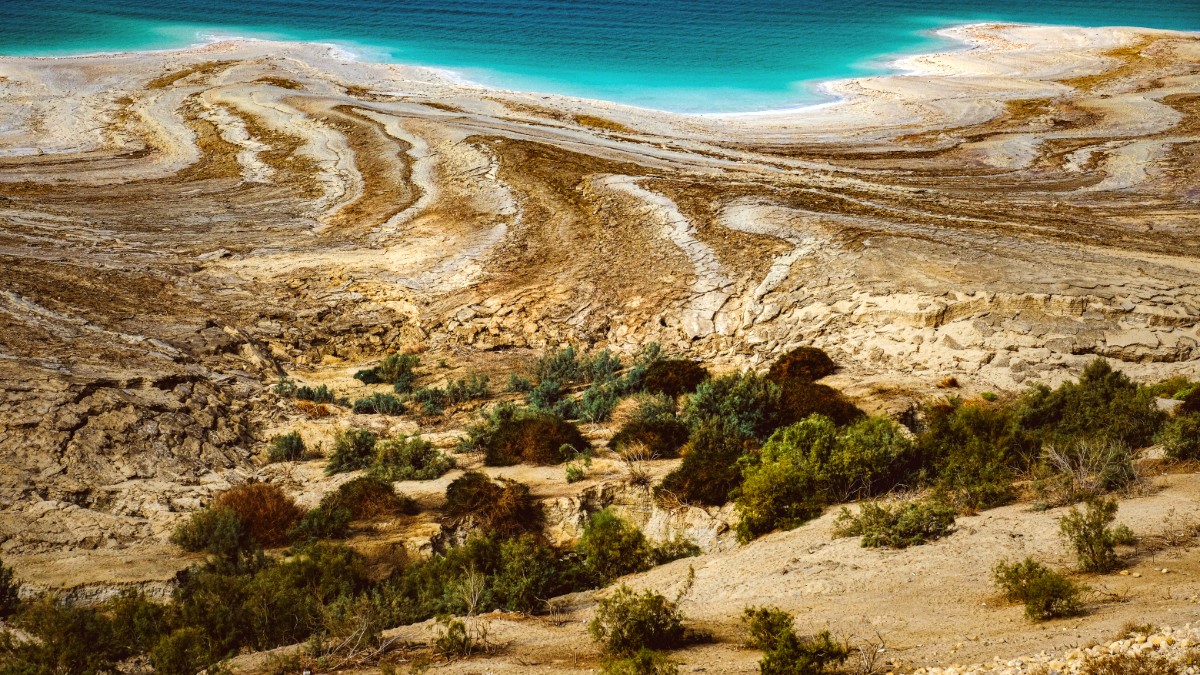
The Dead Sea And Around, Jordan
Jordanian food reflects a blend of Bedouin traditions, with hearty, meat-centric dishes, and influences from the Ottoman Empire and surrounding Arab countries like Syria, Palestine, and Lebanon. The emphasis rests on fresh, seasonal produce, olive oil, and a variety of grains and legumes.
The act of sharing food is deeply ingrained in social customs, making dining a central part of the cultural experience. Discover the heritage in every bite.
Jordanians are recognized for their hospitality. If invited for a meal or offered tea/coffee, accepting signals respect. Refusing outright can be considered impolite.
If eating traditional dishes served communally without utensils (like mansaf), using your right hand is customary.
Sharing dishes is common, especially appetizers (meze). Meals are often leisurely affairs, especially dinner.
Jordan's national dish. This celebratory dish features a large platter of rice, topped with tender pieces of lamb or sometimes chicken, served with a distinct, tangy sauce made from jameed (fermented dried yogurt).
Find it: Mainly in local restaurants outside the Dead Sea resorts, especially in Amman or Madaba. Some hotel buffets at the Dead Sea might feature it on special themed nights.
A Bedouin barbecue experience. Meat (lamb or chicken) and vegetables are slow-cooked for hours in a special underground oven. This method creates incredibly tender and flavorful results.
Find it: Typically in Wadi Rum desert camps or at special Bedouin-themed dinners arranged by tour operators. Not common at Dead Sea resorts.
Meaning "upside-down," this dish consists of rice, meat (chicken or lamb), and fried vegetables (eggplant, cauliflower, potatoes) layered in a pot and then inverted onto a serving platter.
Find it: Local Jordanian restaurants in Madaba or Amman.
A warm, sweet cheese pastry. Features soft cheese topped with crunchy vermicelli-like dough (or semolina) and soaked in sweet sugar syrup, often garnished with crushed pistachios. A delightful dessert.
Baklava: Layers of delicate filo pastry filled with chopped nuts and sweetened with syrup or honey. Dates: Widely available, especially during harvest season. Jordan produces high-quality dates. Ma'amoul: Shortbread pastries filled with dates or nuts, popular during holidays.
Mainly found within the luxury resorts lining the Dead Sea shore. Each major resort hosts multiple restaurants offering diverse cuisines including international buffets and specialty à la carte restaurants (Italian, Asian, Mediterranean, grill houses).
More common in nearby Madaba, where you find a good selection of family-run restaurants serving traditional Jordanian and Middle Eastern dishes at moderate prices. At the Dead Sea, some resorts may have slightly more casual options, but prices generally remain at resort standards.
Budget Eateries & Street Food: Not available directly at the Dead Sea resorts. You will not find street food stalls within the hotel compounds. To experience authentic local and budget-friendly food, venture to Madaba or Amman.
Vegetarian options are generally available, with many naturally plant-based Jordanian dishes. Vegan options may require careful inquiry as some dishes might use butter or dairy. Always ask clearly.
Many fresh, healthy options are present.
Halal: All meat served in Jordan is halal. Kosher: Not widely available; prior arrangements or provisions are necessary. Gluten-Free & Allergens: Awareness is increasing in larger hotels. Communicate dietary restrictions clearly. Rice-based dishes and grilled meats are often safe. Smaller eateries may have limited facilities for cross-contamination prevention.
Halal options are standard, Kosher requires pre-planning.
Not at Dead Sea. Available in Amman (Beit Sitti) and Madaba (informal).
Not common locally. Agricultural sites found elsewhere in Jordan Valley.
No specific festivals at Dead Sea. National holidays feature food.
Resort themed nights (Bedouin Night), private beach dinners, Dead Sea view dining.
For specific dietary needs, communicate clearly and politely with restaurant staff.
In luxury resorts, asking to speak with the chef or a supervisor often results in meeting your requirements.
Always double-check ingredients and cooking methods to confirm they meet your restrictions.
Be patient and proactive in your inquiries.
Cooking classes focusing on Jordanian cuisine (e.g., at Beit Sitti) are very popular in Amman. Food tours exploring Amman's street food scene or traditional markets are highly recommended.
Luxury resorts at the Dead Sea might offer themed dining nights (e.g., a "Bedouin Night" with traditional food and entertainment), private beach dinners, or special barbecue evenings. Restaurants with panoramic views of the Dead Sea deliver a distinct dining experience, especially at sunset. The Dead Sea Panoramic Complex has a restaurant with a spectacular view.
Not available specifically at the Dead Sea resorts. The focus here is on relaxation.
Limited to non-existent at the Dead Sea. For such experiences, Amman offers various traditional craft workshops.
Occasionally available in Amman. Dedicated offerings are rare in the Dead Sea area.
Not common in the immediate Dead Sea area. Agricultural areas are further north in the Jordan Valley.
Some tours might visit olive groves or other agricultural sites in other parts of Jordan.
Food tours exploring Amman's street food scene or traditional markets are highly recommended for a deep culinary dive.
Gain local insights and taste authentic dishes.
When dining out, try to venture beyond your resort occasionally. Local restaurants in Madaba deliver authentic flavors and a chance to experience genuine Jordanian hospitality.
For unique experiences like cooking classes or Bedouin dinners, research and book in advance, especially if traveling during peak season.
Inquire with your resort about any special themed dining nights or entertainment schedules during your stay for a convenient cultural taste.
For specific dietary needs, communicate clearly and politely with restaurant staff.